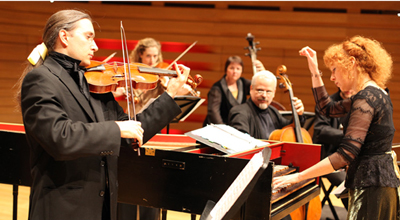by Daniel Hathaway

Brault maintains a busy career in addition to his work with Apollo’s Fire. In Québec, he serves as concertmaster for Les Boréades de Montréal and Ensemble Caprice and runs his his own group, Sonate 1704, devoted to French music for violin and continuo — one of Brault’s specialties. When we spoke via Skype, he had recently returned from Belgium, where he participated in concerts, classes and lectures on music for that combination of musicians. “I seem to be the only person in the world who is a specialist on that topic,” he said. Brault also met with the director of early music at the Paris Conservatory to talk about organizing a similar series of gatherings there.
We began our conversation on the relatively geeky topic of pitch. When I last spoke to Olivier Brault, he was preparing to lead the Akron Symphony in a performance of The Four Seasons a year ago January, and I asked him if he was planning to have his colleagues tune down to old pitch. The surprising answer was that the modern standard of A=440 Hz was also Vivaldi’s pitch at the Ospedale della Pietà in Venice. And it turns out that baroque-style violins with gut strings love to be tuned high — as much in some cases as A=466, the standard that should be used for Monteverdi, “though that causes problems with other instruments,” he said. Apollo’s Fire, which frequently plays at A=415, will play this week’s concerts at A=440.
Brault went on to talk about the essential difference between using traditional gut strings and modern steel strings on the violin. “Metal strings are very precise and ringing and directional,” he said. “If you stand thirty feet away from a violinist who is using steel strings, you hear the player directly. If the guy plays on gut strings, you don’t hear the sound directly, but it fills the space. I made an experiment. We measured the sound of steel and gut strings. They were exactly the same in decibel level, but the two sounds fill the room differently. With gut strings, the sound is more generous and mellow. Baroque musicians were obsessed with the idea of resonance, and this effect is almost like modern ‘surround sound.’”
In Akron last year, Brault was totally in charge of the musical proceedings. “They really expected me to show them how to do it,” he said, “but of course once the machine is started, it goes forward in its own way. In that huge hall, my attitude had to be that of a modern soloist. I can feel freer with Apollo’s Fire. It’s a group that I’ve led for five years, and they catch my moves very well. I can be more subtle and play with more soft dynamics and more rubato.”
Of course, Brault’s colleagues will share the role of shaping the performance. “It’s a signature work for the soloist, but with Apollo’s Fire, I feel half an invited soloist and half a member of the ensemble. Most of them have played The Four Seasons over and over again, and Jeannette Sorrell has a strong idea of how she wants to perform the piece. So we’ll negotiate the interpretation. We’ll play together, and discuss differences in tempo and articulation, and finally we will happily agree about everything.”
In addition to the six local concerts, Olivier Brault and Apollo’s Fire will take The Four Seasons on the road to Pittsburgh (April 18) and Mount Union University in Alliance, OH (April 25), then return to Cleveland to spend two days recording the concertos. “It’s going to be tiring but exciting,” Brault said. “Jeannette Sorrell wanted me to cap my visit with a recording of my own.”
With so many performances both behind him and ahead of him, how does Olivier Brault keep the bloom on Vivaldi’s flower? “There’s always room for changing little things to keep the music fresh. But a beautiful 18th-century painting is always beautiful, and you don’t get tired of it,” he said. “Also, I think that The Four Seasons is the kind of music that makes people feel really happy and leave the concert hall with a smile. We really need that right now. We all need to share beauty and happiness.”
Published on ClevelandClassical.com April 14, 2015.
Click here for a printable copy of this article


